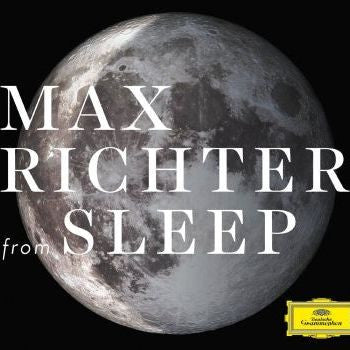Max Richter 'From Sleep' 2xLP
Max Richter 'From Sleep' 2xLP
Couldn't load pickup availability
One of Britain’s leading contemporary composers, Max Richter, has written what is thought to be the longest single piece of classical music ever to be recorded: SLEEP. “It’s an eight-hour lullaby,” says Richter – it is intended to send the listener to sleep.
The landmark work is scored for piano, strings, electronics and vocals – but no words. “It’s my personal lullaby for a frenetic world,” he says. “A manifesto for a slower pace of existence.”
SLEEP will receive its world premiere this September in Berlin, in a concert performance lasting from 12 midnight to 8am at which the audience will be given beds instead of seats and programmes. The eight-hour version will be available as a digital album, and for those who prefer it, a one-hour adaptation of the work – from SLEEP – will be released on CD, vinyl, download, and streaming formats, all through Deutsche Grammophon, on 4 September.
“You could say that the short one is meant to be listened to and the long one is meant to be heard while sleeping,” says Richter, who describes the one-hour version as “a series of windows opening into the big piece”.
Richter has most recently enjoyed acclaim at the Royal Opera House in London for his “lavishly atmospheric score” for Wayne McGregor’s ballet Woolf Works. Influenced equally by post-rock, classical music and the electronic avant-garde, he has composed and released five solo albums and “recomposed” Vivaldi’s Four Seasons for a best-selling album in 2012.
Richter does not expect anyone to sit down and listen to SLEEP in its entirety, although some surely will. “It’s really an experiment to try and understand how we experience music in different states of consciousness.” He says he came up with the idea because of a long-standing fascination: “Sleeping is one of the most important things we all do,” he says. “We spend a third of our lives asleep and it’s always been one of my favourite things, ever since I was a child.”
He consulted eminent American neuroscientist David Eagleman while composing, to learn more about how the human brain functions while sleeping. “For me, SLEEP is an attempt to see how that space when your conscious mind is on holiday can be a place for music to live.”
Coinciding as it does with the renewed interest in durational works within the fine art community, Richter says: “This isn’t something new in music, it goes back to Cage, Terry Riley, and LaMonte Young, and it’s coming around again partly as a reaction to our speeded-up lives – we are all in need of a pause button.”
Richter adds, “I’m perpetually curious about performance conventions in classical music, our rigid rules that dictate how and what music we can appreciate. Somehow in Europe over the last century, as complexity and inaccessibility in music became equated with intelligence and the avant-garde, we lost something along the way. Modernism gave us so many stunning works but we also lost our lullabies. We lost a shared communion in sound. Audiences have dwindled. All my pieces over the last few years have been exploring this, as does SLEEP. It’s a very deliberate political statement for me.”
Condition: New
Label: Deutsche Grammophon


